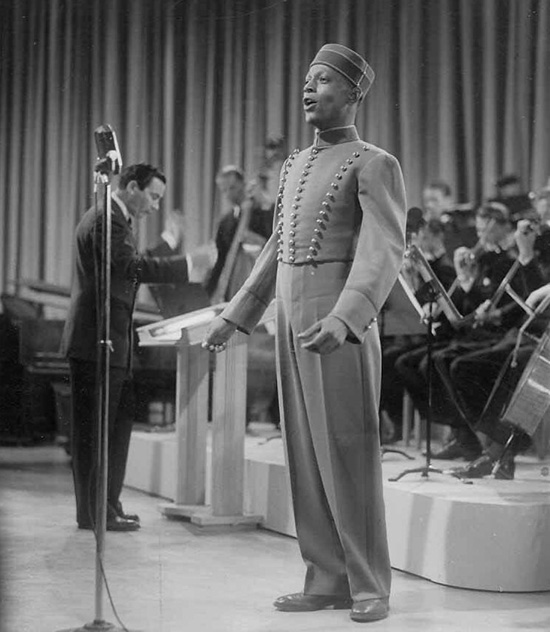This is an ugly tale about US history. Charles Holland started taking voice lessons at age
14. In the 1930s, he was a vocalist in the jazz bands of Fletcher Henderson and Benny Carter. (His brother Herbert, nickname
"Peanuts", was a well-known jazz trumpeter.) He sang musical on stage, and had his own radio show for a short while. But he
wanted to be a classical singer in fact; after further studies in Los Angeles, he made his recital debut at New York Town
Hall in 1940, praised by New York Times critic Ross Parmenter. The same year, Holland got singing roles in two films,
Youth will be served and Hullabaloo; in the latter, he even sang an aria, Vesti la giubba, but had to
dress as a bellhop: black people in classical music were simply not accepted in the US at that time, men even less so than
women (for whom things got, if in glacial pace, better, primarily thanks to Marian Anderson's brave pioneering).
 Holland singing his aria in Hullabaloo
Holland singing his aria in Hullabaloo
In 1946, he was the tenor soloist in the world premiere of Marc Blitzstein's war symphony "Airborne". The cast was
prominent indeed: Leonard Bernstein conducted the New York City Symphony Orchestra, Orson Welles was the narrator. But other
than that, and despite Blitzstein's efforts to foster Holland's career, contracts were few and far between. Two Broadway
productions with Holland are on record (1943 and 1946).
In 1949, Holland had had his fill of it, and relocated to Europe: Sweden first, where already his brother "Peanuts" was
living, then soon to Paris. There, he was finally accepted; he made concert tours of France, appeared at the Besançon
and Aix-en-Provence festivals, sang a lot on television and radio, and gave also concerts in other countries (England,
Finland, Sweden, Norway). He was quite successful in France; Fernand Faniard was, when hearing him sing Vainement, ma bien-aimée on the radio,
"totally flabbergasted" – so flabbergasted that his son still vividly recalled it in an email to me some 65 years later.
Holland eventually made his debut at the Paris Opéra on 22 December 1954 (as Monostatos...
most probably cautious casting by the management, cautious with regard to eventual racists in the audience), and about one
month later, on 28 January 1955, he was the first black singer at the Opéra-Comique, as Nadir.
He sang more opera in other European countries, above all in Germany, but also in the Netherlands (Amsterdam 1959, Rotterdam
1972) and Norway: Faust, Don José, Radamès, Alvaro, probably Grigorij (or another tenor part in Boris Godunov,
I'm not sure), and eventually even Otello (in London). And he gave concerts, not only in many European countries, but also
in Australia, New Zealand and Canada. Racism dogged him nonetheless: in Oslo in 1961, US tenor
Eddy Ruhl refused to share a dressing room with a black singer, that black singer
being Holland. At least, this was Europe, so the Oslo opera sided with Holland – and fired Ruhl.
At long last, he even returned to the US: in 1969 for a first concert, but primarily from 1977 onwards, when conductor
Dennis Russell Davies had discovered him and promoted him greatly, in concert and on record. So Holland came to a series of
hugely successful concerts in his native country, and to his Carnegie Hall debut recital in 1982, at age 73. His final
concert, again in New York City, took place in 1984.
Reference 1: LA Times, 12 November 1987; reference 2: New York Times, 10 November 1987; reference 3; reference 4;
reference 5: Musica, May 1955; reference 6: Kutsch & Riemens; reference 7; reference 8;
reference 8
Picture source

